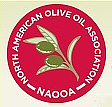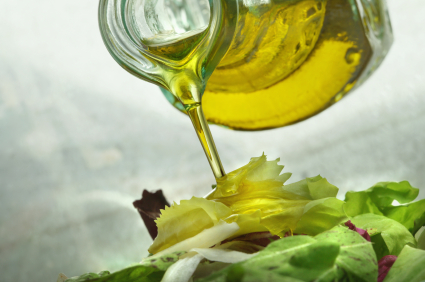Health Benefits of Olive Oil
 Olive oil contains monounsaturated fats, making it considered to be a healthy fat. Replacing saturated fats in the diet with monounsaturated fats offers many health benefits while reducing the risks for certain health problems. However, monounsaturated fats are not the only reason olive oil is beneficial to health. Other ingredients in olive oil also offer protection to the body, but these are available in varying amounts depending on how the grade and processing of the olive oil. There are several factors to consider when purchasing olive oil to gain the most healthful benefits.
Olive oil contains monounsaturated fats, making it considered to be a healthy fat. Replacing saturated fats in the diet with monounsaturated fats offers many health benefits while reducing the risks for certain health problems. However, monounsaturated fats are not the only reason olive oil is beneficial to health. Other ingredients in olive oil also offer protection to the body, but these are available in varying amounts depending on how the grade and processing of the olive oil. There are several factors to consider when purchasing olive oil to gain the most healthful benefits.
What Makes Olive Oil Healthy?
Olive oil contains monounsaturated fats, antioxidants, carotenoids, and polyphenols, which offer protective benefits to the body. These ingredients can help in the following ways:
- Reduce inflammation
- Lower total cholesterol
- Raise good cholesterol
- Lower blood pressure
- Enhance insulin sensitivity
- Increases calcium absorption
- Reduce obesity
- Prevent cognitive decline
The highest levels of antioxidants, carotenoids, and polyphenols are based on the processing method and grade of the olive oil.
How Is Olive Oil Produced?

Once the olives are harvested, they are then cold pressed. This means that no chemicals are used in the process. Once the olives are pressed, or crushed, the oil is spun out of the solids. The oil is spun again to remove any water content. The oil is then graded. If it meets quality standards for human consumption, it can be bottled and sold. If there are any problems found in the grading, it must be refined before being bottled and sold.
Extra Virgin Olive Oil and Grading
 Extra virgin olive oil is the most aromatic and flavorful, offering the highest concentration of beneficial ingredients such as antioxidants and polyphenols. Extra virgin oil comes from the first pressing of a batch of olives. The second pressing results in virgin olive oil, which still has high levels of beneficial ingredients with lots of flavor.
Extra virgin olive oil is the most aromatic and flavorful, offering the highest concentration of beneficial ingredients such as antioxidants and polyphenols. Extra virgin oil comes from the first pressing of a batch of olives. The second pressing results in virgin olive oil, which still has high levels of beneficial ingredients with lots of flavor.
Subsequent pressings and blending of refined olive oil leads to basic olive oil and light olive oil. Refined oil is created with the use of chemical processing. Olive oil only contains a little extra virgin or virgin olive oil, while light olive oil contains just a trace of the better quality oils. The benefit of these blended oils is that they are lighter in taste and will not overpower the taste of the food. However, many of the beneficial components for health are lost as well.
Choosing the Right Brand of Olive Oil
 The United States has a voluntary grading system for olive oil, so care should be taken when choosing the right brand. A company can claim olive oil is virgin or extra virgin, yet still sell just basic olive oil. Counterfeit awards and seals are also used. In Europe, the International Olive Council (IOC) gives strict standards and inspections of oils to be sure they meet the extra virgin label requirements. In the United States, this process is entered into voluntarily by a company, with North American Olive Oil Association (NAOOA) certification. NAOOA certified olive oils are guaranteed to be of the quality and grade claimed on the packaging. You can check to see if your olive oil manufacturer is a member of the NAOOA here: http://aboutoliveoil.org/members.html
The United States has a voluntary grading system for olive oil, so care should be taken when choosing the right brand. A company can claim olive oil is virgin or extra virgin, yet still sell just basic olive oil. Counterfeit awards and seals are also used. In Europe, the International Olive Council (IOC) gives strict standards and inspections of oils to be sure they meet the extra virgin label requirements. In the United States, this process is entered into voluntarily by a company, with North American Olive Oil Association (NAOOA) certification. NAOOA certified olive oils are guaranteed to be of the quality and grade claimed on the packaging. You can check to see if your olive oil manufacturer is a member of the NAOOA here: http://aboutoliveoil.org/members.html
Olive Oil Health Benefits
Olive oil helps with cholesterol levels and blood pressure to reduce the risk of cardiovascular disease, heart attack, and stroke. Add with that olive oil’s ability to help insulin work better in the body to help with Type 2 Diabetes. The anti-inflammatory effects of olive oil help to reduce the risk of certain cancers and rheumatoid arthritis. Olive oil is also beneficial to prevent osteoporosis by helping the bones absorb more calcium. New studies are showing that including olive oil in a healthy diet can also prevent cognitive decline typically associated with aging.
 Weight loss with olive oil is possible when it is used in place of sources of saturated fat in the diet. Olive oil affects how the body breaks down and uses fat tissue. Those who eat olive oil in place of other fat sources also ate less food throughout the day, showing that this oil can help to suppress the appetite slightly. Still, it is important to use only in moderation, because it is a fat and contains a lot of calories.
Weight loss with olive oil is possible when it is used in place of sources of saturated fat in the diet. Olive oil affects how the body breaks down and uses fat tissue. Those who eat olive oil in place of other fat sources also ate less food throughout the day, showing that this oil can help to suppress the appetite slightly. Still, it is important to use only in moderation, because it is a fat and contains a lot of calories.
Olive Oil Side Effects
The number one risk with olive oil is improperly cooking with it. Though the benefits of olive oil can clearly be gained if it used for salads or low temperature cooking, if you overheat olive oil, or any other healthy oil for that matter, most of the beneficial ingredients are lost. Even worse, once you see smoke the fats become carcinogenic. Since olive oil does have a lower “smoke point” than some other oils, some experts advocate not cooking with olive oil at all simply to avoid any possibility of overheating it, and suggest using other oils such as coconut oil and canola oil. But others maintain that sensible cooking poses no threat, and this is the most sound advice.
Also, though olive oil is healthier than many other fats, it is still fat and can lead to weight gain and obesity if overused. Too much fat in the diet of any type can cause diseases of the gall bladder or gallstones. Eating too much fat can also lead to flatulence, bloating, and diarrhea. Those with low blood pressure and low blood sugar should monitor their intake of olive oil due to its health effects.
But all things considered, studies strongly suggest that when used sensibly, olive oil can play an important role in protecting against a variety of heart diseases as well as in offering a number of other health benefits.
If you’ve enjoyed this article, please link back to us at:
[https://goldsourcelabs.com/?p=353]

Finally a site where my questions have answers! While in Fairfield, CA. stopp[ed at Sepay Groves Olive Oil store and during our discussion a health benefit numbering system for olive oil was brought up and several olive oils were demonstrated with numbers from 80 to 488 were tasted. I have been unable to find any information about this numbering system, including UC Davis Olive Oil Department. Can you provide any information, or was this just something to enhance their sales.
Thanks for the great site
Jack Chedester
That’s a good question Jack. You may want to just telephone SePay Oils at 707-434-8222 and ask them directly
Fantastic post, very informative. I ponder why the opposite specialists of this sector don’t notice this. Please continue these articles.
This is the perfect blog for anybody who wishes to find out about this topic. You understand so much its almost tough to argue with you (not that I personally will need to…HaHa). You certainly put a new spin on a subject that has been written about for a long time. Wonderful stuff, just great!